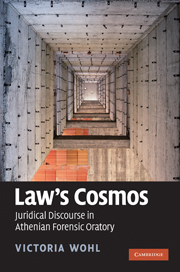Book contents
- Frontmatter
- Contents
- Preface: before the law
- Introduction: the rhetoric of law
- PART I THE BOUNDARIES OF LEGAL DISCOURSE
- PART II THE LEGAL SUBJECT
- 3 Legal fictions: subjects probable and improbable
- 4 Logos biou: law's life stories
- PART III TIME, MEMORY, REPRODUCTION: LAW'S PAST AND FUTURE
- Conclusion: the paradigmatic law
- Bibliography
- Index locorum
- General index
4 - Logos biou: law's life stories
from PART II - THE LEGAL SUBJECT
Published online by Cambridge University Press: 07 September 2010
- Frontmatter
- Contents
- Preface: before the law
- Introduction: the rhetoric of law
- PART I THE BOUNDARIES OF LEGAL DISCOURSE
- PART II THE LEGAL SUBJECT
- 3 Legal fictions: subjects probable and improbable
- 4 Logos biou: law's life stories
- PART III TIME, MEMORY, REPRODUCTION: LAW'S PAST AND FUTURE
- Conclusion: the paradigmatic law
- Bibliography
- Index locorum
- General index
Summary
There is no concept “I” that incorporates all the I's that are uttered at every moment in the mouths of all speakers…Then, what does I refer to? To something very peculiar which is exclusively linguistic: I refers to the act of individual discourse in which it is pronounced, and by this it designates the speaker…And so it is literally true that the basis of subjectivity is in the exercise of language.
Benveniste 1971: 226I am lying.
TROPES OF SUBJECTIVITY
The courtroom speech tells a life story, a logos biou. Litigants relate glowing autobiographies of their own lives and vicious exposés of the lives of their opponents. A vision of the subject is always implicit in juridical discourse, and subjective strategies are a vital means by which that discourse produces and secures legal meaning. But what kind of story is law's logos biou and what kind of life does it narrate? Legal theorists who put these questions to modern law often conclude that legal discourse in general is unable to embrace a complex subject, whether it is the subject of psychoanalysis, with its unconscious motivations and ambivalent desires, or the decentered and ontologically divided subject of postmodernism. These scholars argue (with various attitudes of regret or approbation) that law both assumes and requires as its ideal subject a unified and unitary, autonomous and rational individual, the conscious initiator of intentional action and the identifiable bearer of legal rights.
- Type
- Chapter
- Information
- Law's CosmosJuridical Discourse in Athenian Forensic Oratory, pp. 155 - 198Publisher: Cambridge University PressPrint publication year: 2010

